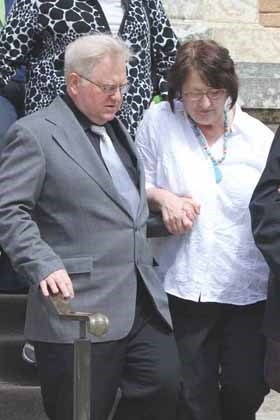The Crown wrapped up its case against Kim Walker after three days of testimony in his second-degree murder trial last week.
A string of witnesses painted a generally consistent picture of the events of March 13, 2003, the day that James Hayward died. None disputed that it was Walker who shot Hayward when he arrived at the latter's residence to retrieve his 16-year-old daughter Jadah, who had been living with the 24-year-old since the previous September.
The most dramatic testimony of the week came from Jadah Walker herself. Jadah, now 24, was called to the stand on Wednesday morning by the Crown's Robin Ritter.
Jadah testified that she answered the door when Walker arrived at Hayward's house on Agricultural Avenue that day. Her father asked her one last time to "please come home," she said.
According to Jadah, Hayward came up behind her at that point and began yelling at Walker to leave the property. It was then that Walker, without speaking, retrieved a pistol from a holster at his side and fired it repeatedly at Hayward.
It all happened within 20 seconds, Jadah testified. "It was just chaotic."
Afterwards, said Jadah, her father set the gun down on a nearby weight bench and began to pick up the spent shells from the ground, as she used to see him do following practice at the target range.
The autopsy report and testimony from police confirmed that Hayward was shot five times in the torso and arms. He likely died within seconds.
The other occupants of the house fled when the shooting began, but Jadah Walker stayed with the body. Her father helped her look for a phone to call 911, she told the jury.
Jadah then revealed a new piece of information: after she called for help, Walker knelt down over James Hayward's body and traced a cross in blood on Hayward's forehead.
Witnesses agreed that Walker gave himself up without incident when police arrived a short time later.
Under cross-examination by defence attorney Balfour Der, Jadah Walker gave further details about her relationship with James Hayward. She met him at age 13 through a friend who purchased marijuana from Hayward, she said, and the two became romantically involved when she was 15. She left home to move in with Hayward on the day of her 16th birthday, knowing her parents would no longer be able to stop her.
Under Der's questioning, Jadah described Hayward as a steroid-using bodybuilder prone to violence, "aggressive and relentless" in a fight. He was a dealer and user of various hard drugs, Jadah testified, and he introduced her to cocaine, crack cocaine, and morphine. On one occasion, claimed Jadah, Hayward injected her with morphine while she was sleeping.
During her time living with Hayward, Jadah used drugs eight to ten times a day, she testified.
Jadah recalled her parents' months-long battle to remove her from Hayward's influence, which eventually led to her being escorted by police into Yorkton's psychiatric unit for a 72-hour evaluation.
A letter from Hayward written during this period was entered into evidence by the defense. It showed him telling Jadah, "I have never had my girlfriend stolen like this before," He went on to say that he would "never forgive" Jadah's parents for sending police into their house.
The shooting occurred on the day of Jadah's release from psychiatric care after she returned to Hayward's residence. That morning, said Jadah, Hayward and her father argued on the phone, and Hayward told Walker, "You'll never see Jadah again."
Jadah testified that on an earlier occasion, following another argument about her parents, Hayward had told her, "for $3,000, you can make someone disappear."
Jadah told the jury she is doing "wonderful" today. She said she no longer uses drugs and is in a six-year common-law relationship with the father of her three-year-old son.
After Jadah Walker's testimony, Justice Ellen Gunn cautioned the jury against concluding that "the bad character of the deceased excuses the violence against him." Whether or not the claims made about him are true, she said, Hayward was entitled to the protection of the law.
Outside the court room, Hayward's mother, Lorrie Getty, insisted that much of what Jadah had said about her son was false.
"In my opinion, she's trying to keep her dad from going back to jail, and she's doing it at the expense of James and everyone that loved James. It's just not fair."
Getty acknowledged that Hayward had been arrested for selling marijuana, but disputed the other claims about him.
"His lifestyle wasn't what I wanted, but it wasn't this. Do you understand? It wasn't this."
Through its other witnesses, the Crown attempted to cast Walker's actions as carefully planned and premeditated. Firearms expert Grant Veitch testified that it would likely have taken Walker about 10 minutes to prepare his weapon for the shooting. Jadah Walker's friend Jessica Andrew alleged that she'd heard Walker say he would like to "blow James' head off" several days before the incident.
Jadah Walker described her father as a peaceful man, and said she had never heard him threaten violence against Hayward.
Arguments from the defence were scheduled to begin on Tuesday morning, after press time.
Walker's trial is expected to last up to two more weeks.




